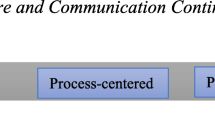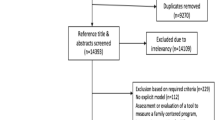Abstract
Purpose
Communication is essential to providing family-centered care in pediatric oncology. Previously, we developed a functional model of communication between parents and clinicians. Prior research has not examined the domains and purposes of communication between children and clinicians. We explored parental perspectives to begin understanding this communication.
Methods
Secondary analysis of semi-structured interviews with 80 parents of children with cancer across 3 academic medical centers during treatment, survivorship, or bereavement. We employed semantic content analysis, using the functional model of parental communication as an a priori framework.
Results
We identified 6 distinct functions of communication in child-clinician interactions: building relationships, promoting patient engagement, addressing emotions, exchanging information, managing uncertainty, and fostering hope. These communication functions were identified by parents of older (> 13 years old) and younger (< 12 years old) children, although the specific manifestations sometimes differed by age. Notably, age was not always an indicator of the child’s communication needs. For example, some parents noted older children who did not want to discuss difficult topics, whereas other parent described younger children who wanted to know every detail. Two functions from the previous parental model of communication were absent from this analysis: supporting family self-management and making decisions.
Conclusion
Interviews with 80 parents provided evidence for 6 distinct functions of communication between children and clinicians. These functions apply to older and younger children, although specific manifestations might vary by age. This functional model provides a framework to guide clinicians’ communication efforts and future communication research.

Similar content being viewed by others
References
(1995) Informed consent, parental permission, and assent in pediatric practice. Committee on Bioethics, American Academy of Pediatrics Pediatrics 95: 314-317
Arabiat DH, Alqaissi NM, Hamdan-Mansour AM (2011) Children’s knowledge of cancer diagnosis and treatment: Jordanian mothers’ perceptions and satisfaction with the process. Int Nurs Rev 58:443–449
Bartholome WG (1989) A new understanding of consent in pediatric practice: consent, parental permission, and child assent. Pediatr Ann 18:262–265
Bartholome WG (1995) Informed consent, parental permission, and assent in pediatric practice. Pediatrics 96:981–982
Barton KS, Tate T, Lau N, Taliesin KB, Waldman ED, Rosenberg AR (2018) “I’m not a spiritual person.” How hope might facilitate conversations about spirituality among teens and young adults with cancer J Pain Symptom Manage
Caughlin JP (2010) A multiple goals theory of personal relationships: conceptual integration and program overview. J Soc Pers Relat 27:824–848
El Malla HK, Steineck U, Wilderäng G, Elborai UES, Ylitalo YN (2013) Parental trust in health care - a prospective study from the Children’s Cancer Hospital in Egypt. Psychooncology 22:548–554
Epstein RM, Street RL, Jr. (2007) Patient-centered communication in cancer care: promoting healing and reducing suffering National Cancer Institute NIH Publication No. 07-6225.
Essig SS C, Kuehni CE, Weber H, Kiss A (2016) Improving communication in adolescent cancer care: a multiperspective study pediatric blood and cancer 63: 1423-1430
Feudtner C, Carroll KW, Hexem KR, Silberman J, Kang TI, Kazak AE (2010) Parental hopeful patterns of thinking, emotions, and pediatric palliative care decision making: a prospective cohort study. Arch Pediatr Adolesc Med 164:831–839
Forsey M, Salmon P, Eden T, Young B (2013) Comparing doctors’ and nurses’ accounts of how they provide emotional care for parents of children with acute lymphoblastic leukaemia. Psychooncology 22:260–267
Gibson F, Aldiss S, Horstman M, Kumpunen S, Richardson A (2010) Children and young people’s experiences of cancer care: a qualitative research study using participatory methods. Int J Nurs Stud 47:1397–1407
Gray MFLEJ, Beatty T, Rosenberg AR, Wernli KJ (2018) Balancing hope and risk among adolescent and young adult cancer patients with late-stage cancer: a qualitative interview study. Journal of Adolescent and Young Adult Oncology 7:673–680
Guest G, Bunce A, Johnson L (2006) How many interviews are enough? An experiment with data saturation and variability Field methods 18: 59-82
Hill DL, Nathanson PG, Carroll KW, Schall TE, Miller VA, Feudtner C (2018) Changes in parental hopes for seriously ill children Pediatrics 141
Hill DL, Nathanson PG, Fenderson RM, Carroll KW, Feudtner C (2017) Parental concordance regarding problems and hopes for seriously ill children: a two-year cohort study. J Pain Symptom Manag 53:911–918
Hillen MA, de Haes HC, Smets EM (2011) Cancer patients’ trust in their physician-a review. Psychooncology 20:227–241
Hillen MA, Onderwater AT, van Zwieten MC, de Haes HC, Smets EM (2012) Disentangling cancer patients’ trust in their oncologist: a qualitative study. Psychooncology 21:392–399
Hsieh HF, Shannon SE (2005) Three approaches to qualitative content analysis. Qual Health Res 15:1277–1288
Ilowite MF, Cronin AM, Kang TI, Mack JW (2017) Disparities in prognosis communication among parents of children with cancer: the impact of race and ethnicity Cancer 123: 3995-4003
Jalmsell L, Lovgren M, Kreicbergs U, Henter JI, Frost BM (2016) Children with cancer share their views: tell the truth but leave room for hope. Acta Paediatr 105:1094–1099
Kamihara J, Nyborn JA, Olcese ME, Nickerson T, Mack JW (2015) Parental hope for children with advanced cancer. Pediatrics 135:868–874
Katz AL, Webb SA (2016) Informed consent in decision-making in pediatric practice. Pediatrics:138
Kon AA (2006) Assent in pediatric research. Pediatrics 117:1806–1810
Mack JW, Fasciano KM, Block SD (2018) Communication about prognosis with adolescent and young adult patients with cancer: Information needs, prognostic awareness, and outcomes of disclosure J Clin Oncol: Jco2018782128
Mack JW, Fasciano KM, Block SD (2019) Adolescent and young adult cancer patients’ experiences with treatment decision-making. Pediatrics: e20182800
Mack JW, Wolfe J, Cook EF, Grier HE, Cleary PD, Weeks JC (2007) Hope and prognostic disclosure. J Clin Oncol 25:5636–5642
Mack JW, Wolfe J, Cook EF, Grier HE, Cleary PD, Weeks JC (2009) Peace of mind and sense of purpose as core existential issues among parents of children with cancer. Arch Pediatr Adolesc Med 163:519–524
Mechanic D, Meyer S (2000) Concepts of trust among patients with serious illness. Soc Sci Med 51:657–668
Montgomery K, Sawin KJ, Hendricks-Ferguson VL (2016) Experiences of pediatric oncology patients and their parents at end of life: a systematic review. J Pediatr Oncol Nurs 33:85–104
Ngwenya N, Kenten C, Jones L, Gibson F, Pearce S, Flatley M, Hough R, Stirling LC, Taylor RM, Wong G, Whelan J (2017) Experiences and preferences for end-of-life care for young adults with cancer and their informal carers: a narrative synthesis Journal of adolescent and young adult oncology 6: 200-212
Nyborn JA, Olcese M, Nickerson T, Mack JW (2016) “Don’t try to cover the sky with your hands”: parents’ experiences with prognosis communication about their children with advanced cancer. J Palliat Med 19:626–631
Nyborn JAO, M. : Nickerson, T. : Mack, J. W. (2016) “Don’t try to cover the sky with your hands”: parents’ experiences with prognosis communication about their children with advanced cancer. J Palliat Med 19:626–631
Ruhe KMB, D. O. : Brazzola, P. : Hengartner, H. : Elger, B. S. : Wangmo, T. (2015) Participation in pediatric oncology: views of child and adolescent patients Psychooncology
Sisk B, Baker JN (2019) A model of interpersonal trust, credibility, and relationship maintenance Pediatrics
Sisk BA, Dobrozsi S, Mack JW (2020) Teamwork in prognostic communication: addressing bottlenecks and barriers Pediatr Blood Cancer: e28192-e28192
Sisk BA, DuBois J, Kodish E, Wolfe J, Feudtner C (2017) Navigating decisional discord: the pediatrician’s role when child and parents disagree Pediatrics 139
Sisk BA, Fasciano K, Block SD, Mack JW (2019) Longitudinal prognostic communication needs of adolescents and young adults with cancer Cancer
Sisk BA, Friedrich A, Blazin LJ, Baker JN, Mack JW, DuBois J (2020) Communication in pediatric oncology: a qualitative study Pediatrics 146: e20201193
Sisk BA, Friedrich AB, Mozersky J, Walsh H, DuBois J (2018) Core functions of communication in pediatric medicine: an exploratory analysis of parent and patient narratives Journal of cancer education : the official journal of the American Association for Cancer Education 35: 256-263
Sisk BA, Kang TI, Mack JW (2018) Sources of parental hope in pediatric oncology Pediatr Blood Cancer
Sisk BA, Kang TI, Mack JW (2020) Racial and ethnic differences in parental decision-making roles in pediatric oncology. J Palliat Med 23:192–197
Sisk BA, Mack JW, Ashworth R, DuBois J (2018) Communication in pediatric oncology: State of the field and research agenda. Pediatr Blood Cancer 65:65. https://doi.org/10.1002/pbc.26727
Sisk BA, Schulz GL, Mack JW, Yaeger L, DuBois J (2019) Communication interventions in adult and pediatric oncology: a scoping review and analysis of behavioral targets. PLoS One 14:e0221536
Street RL Jr, Mazor KM, Arora NK (2016) Assessing patient-centered communication in cancer care: measures for surveillance of communication outcomes. J Oncol Pract 12:1198–1202
Tong A, Sainsbury P, Craig J (2007) Consolidated criteria for reporting qualitative research (COREQ): a 32-item checklist for interviews and focus groups. Int J Qual Health Care 19:349–357
Vaismoradi M, Turunen H, Bondas T (2013) Content analysis and thematic analysis: implications for conducting a qualitative descriptive study. Nurs Health Sci 15:398–405
von Essen L, Enskar K, Skolin I (2001) Important aspects of care and assistance for parents of children, 0-18 years of age, on or off treatment for cancer. Eur J Oncol Nurs 5:254–264
Wasserman JA, Navin MC, Vercler CJ (2019) Pediatric assent and treating children over objection Pediatrics 144: e20190382
Yap TYY, A. D. : Hizlan, S. : Zyzanski, S. J. : Angiolillo, A. L. : Rheingold, S. R. : Baker, J. N. : Kodish, E. D. (2010) Informed consent for pediatric phase 1 cancer trials: physicians’ perspectives Cancer 116: 3244-3250
Young BHJ, Gravenhorst K, Ward J, Eden T, Salmon P (2013) Is communication guidance mistaken qualitative study of parent-oncologist communication in childhood cancer. Br J Cancer 109:836–843
Zwaanswijk M, Tates K, van Dulmen S, Hoogerbrugge PM, Kamps WA, Bensing JM (2007) Young patients’, parents’, and survivors’ communication preferences in paediatric oncology: Results of online focus groups BMC Pediatr 7
Data sharing statement
The data that support the findings of this study are available upon request from the corresponding author. The data are not publicly available due to privacy or ethical restrictions.
Funding
This study was funded by the National Center for Advancing Translational Sciences of the National Institutes of Health (UL1 TR002345) and the American Society of Clinical Oncology Young Investigator’s Award.
Author information
Authors and Affiliations
Contributions
Dr. Sisk participated in conceptualization, design, and implementation of the study, participated in formal analysis, drafted the initial manuscript, and reviewed and revised the manuscript. Dr. Schulz participated in formal analysis and reviewed and revised the manuscript. Dr. Blazin, Dr. Baker, Dr. Mack, and Dr. DuBois participated in conceptualization and design of the study, formal analysis, and reviewed and revised the manuscript. All authors approved the final manuscript as submitted and agree to be accountable for all aspects of the work.
Corresponding author
Ethics declarations
Ethics approval
Institutional review boards at all sites approved this study.
Consent to participate
All participants provided voluntary informed consent to participate in this study.
Consent to publish
All participants consented to the research study and subsequent publications.
Conflict of interest
The authors declare no competing interests.
Additional information
Publisher’s note
Springer Nature remains neutral with regard to jurisdictional claims in published maps and institutional affiliations.
Supplementary information
Appendix 1
COREQ checklist (DOCX 15 kb)
Appendix 2
Interview guide (DOCX 22 kb)
Rights and permissions
About this article
Cite this article
Sisk, B.A., Schulz, G.L., Blazin, L.J. et al. Parental views on communication between children and clinicians in pediatric oncology: a qualitative study. Support Care Cancer 29, 4957–4968 (2021). https://doi.org/10.1007/s00520-021-06047-6
Received:
Accepted:
Published:
Issue Date:
DOI: https://doi.org/10.1007/s00520-021-06047-6




